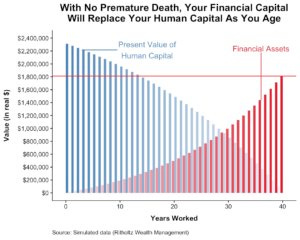Life Insurance is Not for Saving
Stop buying life insurance as a savings strategy. Stop buying it as a tax-deferral vehicle for retirement savings. Stop spending thousands of dollars a month on life insurance premiums, at least until you read the rest of this post.
Life insurance is not a retirement savings strategy.
Why do we buy life insurance?
A person should buy life insurance, generally speaking, for one reason: because there will be a financial impact on his business or family were they to die.
– Jonathan Novy, Investment Advisor at Ritholtz Wealth
Typically, your insurance need is high early in life, when you have many working years ahead. The insurance need declines over time, ultimately reducing to zero at some point prior to retirement. This insurance need curve lends itself elegantly to term life insurance. Term insurance, as the name implies, lasts for a certain term; such as 10, 20, or 30 years. Term insurance is the cheapest option because insurance companies know that many of the policy owners will outlive their term and the insurance company will not have to pay the death benefit.

Enter the life insurance agent. Here we have a thoroughbred salesperson who is incentivized to sell as many life insurance contracts as he can. He is trained to offer a rebuttal to every objection. Term life insurance is cheap, which means the sales commissions are low. No insurance agent can make a living selling term policies alone. Therefore, he has a million reasons you should buy whole life, variable universal life, and other forms of cash value life insurance.
Let’s look under the hood of a permanent life insurance policy. First, there is the underlying cost of insurance. This is akin to the premium you pay for term insurance. While you are young, this cost is low, but as you age, the price of insurance grows. This matters when you access your “tax free retirement savings” later through policy loans. Even when the policy is “paid up”, and you don’t owe premiums, the cost of insurance is charged against the policy. This matters if the annual dividend drops below the cost of insurance, and it’s one of the reasons that policies crater and lapse.
But the cash value grows tax-deferred!
This is true, but life insurance is one of the most expensive ways to “invest”. Whole life policies pay low to mid-single digit dividends. All types of policies add the cost of insurance, selling and administrative expenses, and a host of additional riders to the total cost. If you’ve ever looked at a whole life illustration, you probably noticed it takes ten or more years to break even with the premiums paid. Variable policies are riskier. The first few years of market returns can make or break a variable policy. If market returns are negative, you may end up paying higher premiums later to keep the same death benefit. What a nightmare.
But cash value can be withdrawn tax-free in retirement!
This is partially true. The premiums you paid in can be withdrawn tax-free, but to access the growth, you must take a loan against the policy. You are now paying interest on a loan inside the policy at the same time the cost of insurance is rising. This combination can be deadly if costs over run the dividends and cash value available to pay these costs. The policy owner now needs to repay the loan and/or pay additional premiums to keep the policy in force. When you die, the loan balance is subtracted from the death benefit. Remind me again why we bought this policy?
Permanent life insurance is expensive. When faced with a budget crunch such as a job loss, healthcare expenses, or college tuition, life insurance premiums are often the first item to cut. Suddenly, the “forced saving” mechanism thought to be helpful becomes a burden. That rosy cash value projection withers to dust.
These are valid reasons to buy permanent life insurance:
You have an estate larger than the Federal (or State) estate tax exemption, and you want to provide your heirs with liquidity to pay the tax
You have dependents who need more than the assets you can pass down to them to survive
You are looking to shift assets outside of your taxable estate to pass to your heirs
Your partners want to fund the purchase of your share of a privately held business upon your death
I may have missed a few, but you will notice that savings is not in the list. If your goal is to save for college, or retirement, or anything else, there are less expensive and more flexible ways to do so. Just say no to expensive permanent life insurance policies that you don’t need.
The post Life Insurance is Not for Saving appeared first on The Belle Curve.



